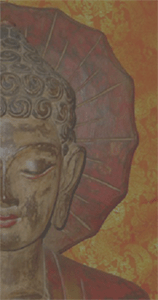
A young man came to visit the Buddha one day. He was filled with questions. He asked the Buddha about the nature of the universe, about the meaning of life, about death, and about many other things. The Buddha paused, and then in reply asked the man a question of his own. “Did someone tell you that I would answer these questions for you?” “No,” replied the young man, “I am just eager to learn.” The Buddha regarded him closely, and then taught an unexpected lesson.
“Once there was a man who was wounded by a poisoned arrow. A doctor was quickly summoned. The poison was deadly, and the man had little time left. As the doctor began to extract the arrow, the wounded man stopped him and asked, ‘Wait. I must know who shot me! Why did he do this? What kind of man was he? Was he angry or jealous? Did he shoot me out of rage, or by mistake?’ The doctor explained that the man had a choice: allow the arrow to be removed right away without any answers, and live, or wait for all his questions to be answered, and die.”
What he taught, the Buddha explained to the young man, was a way to end suffering. That was far more important than knowing the structure of the heavens. Why would you want to waste one minute on unimportant details when the most important work in your life has not even started? Learn to free your mind, end your delusion, and end your suffering before worrying about all these other questions.
The Buddha lived in a time when the Samkhya philosophy was becoming widely accepted. However, the Buddha was a very pragmatic man. He did not bother with models of the cosmos. He wanted everyone to explore his or her own situation in minute detail. The Buddha’s teachings gave specific advice on how to avoid suffering and obtain release.
There are few hierarchical models of mind and consciousness in the Buddha’s teachings. If there is a psychology at all, it is an applied psychology. It resonates today closely to the schools of behavioral psychologies, which we will address in the next part of our journey. For now we will explore a brief vignette of the life of the Buddha, his realizations, and his main teachings as they can be applied to our practice of yoga.
(Next: The Historical Buddha )
